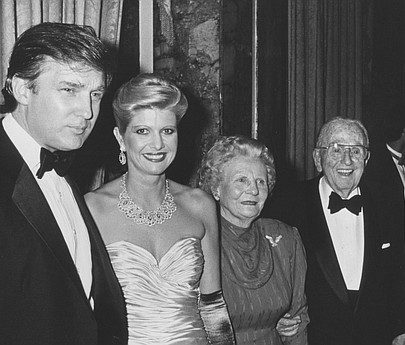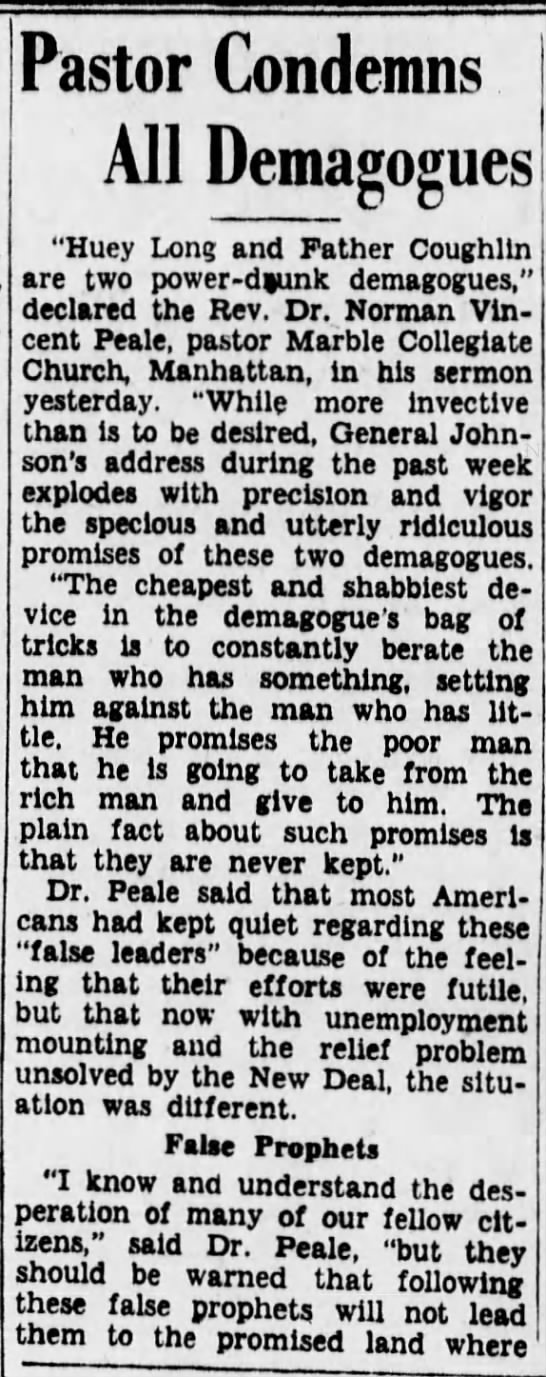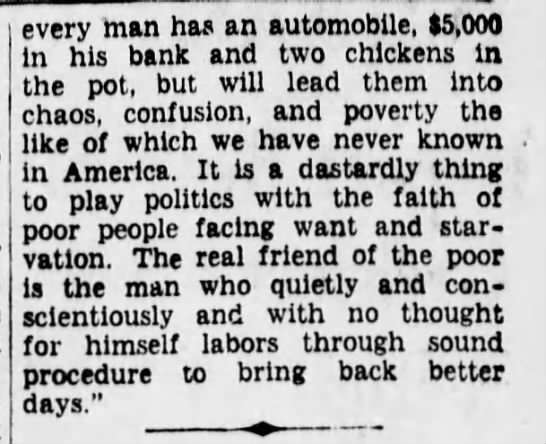From Rev. Ike to Dr. Phil to President Trump, America has embraced mountebanks of many types, from religion to medicine to politics, asking only that they be skilled at satisfying our hunger to turn every last thing in the country into entertainment.
Norman Vincent Peale, a pastor and peddler of positivity, fit somewhere into that paradigm, offering a malleable feel-good philosophy that encouraged personal fulfillment rather than self-sacrifice, a faith that was a forerunner of the type of prosperity gospel favored by mansionaires like the Osteens. It’s no wonder Donald Trump worshiped so devoutly at his altar. In fact, Peale presided over the serial groom’s first nuptials.
Oddly, the pastor spent the pre-WWII era worried that a demagogic faux populist would be elevated to the Oval Office, not realizing, of course, that one of his future parishioners would come closest to filling the bill. Despite his fear of American Fascism, it’s no sure thing that Peale would have been aghast at Trump’s ascent. The religious leader himself was known for some bigoted views and was deeply offended by the New Deal and any social programs aimed at mitigating the suffering of desperate Depression-ites. Was he so pliant that he could have twisted himself into a Trump supporter? No way of knowing, but he certainly played an important role, willingly or not, in the development of the Worst American™.
A concise rendering of the Trump-Peale connection by Michael Kruse of Poitico:
He was born into a house that Norman Vincent Peale helped build.
Peale’s cheery, simple tips allowed Trump’s father to alleviate his anxieties and mitigate the effects of his innately awkward, dour disposition. Emboldened, Fred Trump banked hundreds of millions of dollars building single-family houses and then immense apartment buildings in New York’s outer boroughs. Peale appealed to the elder Trump, too, because both men embraced conservative, right-wing, us-versus-them politics—an important but often forgotten portion of Peale’s M.O.
A generation down, Peale appealed to Donald Trump because Trump idolized his father, and because what Fred Trump drilled into his most eager, most ambitious, most like-minded son—be a killer; be a king; be a winner, not a loser—is what made that son so receptive to the teachings of Peale. Born in 1946, Donald Trump’s childhood was spent in a house with white columns and nine bathrooms and a live-in maid and chauffeur in Jamaica Estates, Queens. Sometimes, when it rained or snowed, he did his paper route from the back of his father’s limousine.
Peale, known as “God’s salesman,” reached the peak of his influence in the heart of Trump’s childhood, preaching in the 1950s to millions of people on Sundays at Marble Collegiate Church on Fifth Avenue in Manhattan as well as through a syndicated newspaper column, radio and television shows, his Guidepostsmagazine and a spate of books that were self-help trailblazers—first and foremost, of course, The Power of Positive Thinking, his defining work and wild bestseller that came out in 1952. It offered chapters such as “Believe in Yourself,” “Expect the Best and Get It” and “I Don’t Believe in Defeat.” “Whenever a negative thought concerning your personal powers comes to mind, deliberately voice a positive thought,” he wrote. “Actually,” Peale once said, “it is an affront to God when you have a low opinion of yourself.”
Peale was far from universally popular. One psychiatrist dubbed The Power of Positive Thinking “saccharine terrorism.” And during the 1952 presidential campaign, the Democratic nominee made his feelings plain. “Speaking as a Christian,” the brainy Adlai Stevenson said at a Baptist convention in Texas, “I would like to say that I find the Apostle Paul appealing and the Apostle Peale appalling.” But Peale permanently altered the way many Americans worship. His was a precursor to the prosperity gospel espoused today by, say, the toothy Joel Osteen. “By repeatedly equating business acumen with piety, uncertainty with religious doubt, and personal and cultural failure with godlessness, Peale and his admirers helped to redefine religious Americans as socially superior winners,” Northwestern University English professor Christopher Lane wrote in his 2016 book, Surge of Piety: Norman Vincent Peale and the Remaking of American Religious Life.
What Peale peddled was “a certain positive, feel-good religiosity that demands nothing of you and rewards you with worldly riches and success,” said Princeton University historian Kevin Kruse, the author of One Nation Under God: How Corporate America Invented Christian America. “It’s a self-help gospel … the name-it-and-claim-it gospel.”
A pair of articles follow from 1935 editions of the Brooklyn Daily Eagle in which Peale warned of the rise of an American Mussolini.
From May 27, 1935:
 From March 11, 1935:
From March 11, 1935:




